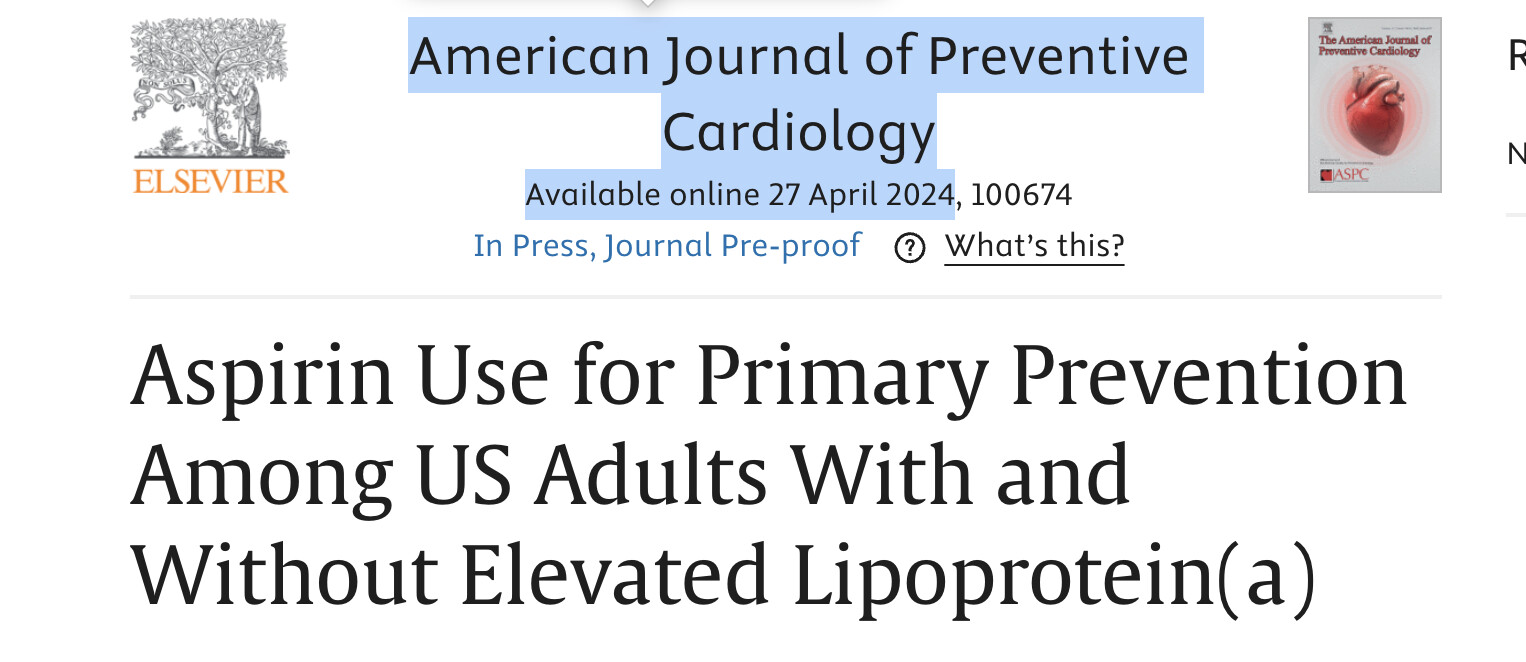Quality Asprin Study (American Journal of Preventive Cardiology, April 2024:
52% lower risk of ASCVD mortality with regular aspirin use (HR=0.48, 95% CI: 0.28-0.83) << That’s an impressive result!
https://www.sciencedirect.com/science/article/pii/S2666667724000424
regular aspirin use was associated with a 52% lower risk of ASCVD mortality among individuals with elevated Lp(a)
Yet no all cause effect and higher CVD for high dose aspirin users in this study Low- or high-dose preventive aspirin use and risk of death from all-cause, cardiovascular disease, and cancer: A nationally representative cohort study - PMC
FWIW
This was retrospective association study?
“What’s it all about when you sort it out, Alfie?”
The study linked shows the same. Improvement for high lp(a), increased risk for low lp(a).
See also:
https://www.ahajournals.org/doi/10.1161/JAHA.123.033562
In the propensity‐matched cohort, aspirin use was not significantly associated with a lower risk of CHD events in those with lipoprotein(a) ≤50 mg/dL (hazard ratio [HR], 0.80 [95% CI, 0.58–1.10). However, aspirin use was associated with significantly lower risk of CHD events among those with lipoprotein(a) >50 mg/dL (HR, 0.54 [95% CI, 0.31–0.93];
One study from 2002:
Aspirin lowered serum Lp(a) concentrations to approximately 80% of the baseline values in patients with high Lp(a) concentrations (>300 mg/L).
Here we see a recent (2023) review that acknowledges the low quality of evidence, but finds a good reason to start aspirin therapy if lp(a) > 50 and/or in the presence of rs3798220-C polymorphism in the LPA gene.
https://www.sciencedirect.com/science/article/pii/S2666667723001204?via%3Dihub
In addition to the antiplatelet and antithrombotic properties, aspirin may have an Lp(a)-lowering effect, particularly in patients with very elevated Lp(a) [18]. While the quality of clinical evidence regarding the Lp(a)-lowering effect of aspirin is currently lacking, there is some biological plausibility to this effect. The mechanism by which aspirin is thought to lower Lp(a) level is by inhibiting its production in the liver by suppressing apo(a) mRNA expression, independent of cyclooxygenase-1. Reduction of apo(a) production in hepatocyte cultures by aspirin has been demonstrated [8]. The size of this effect in clinical trials has not been well studied. There are a few small studies that have shown a quite significant Lp(a) lowering effect of aspirin therapy [18,19] with a wide range of effect size.
The reason this interests me is my lp(a) of 140.6 nmol/L. 10 mg atorvastatin and 5 mg ezetimibe have lowered my apoB to 70 mg/dL from a high of 147 mg/dL. I am looking into taking bempedoic acid for more lowering, also considering upping my atorvastatin to 20 mg. Considering my high lp(a) and high apoB, I am looking at low dose aspirin therapy to reduce risk. At least until the new lp(a) drugs become widely available.
Thoughts on this? I am aware of bleeding risk, both GI and cranial. Age 47 Male, no history of ASCVD, Do not have rs3798220-C polymorphism. Have not had CAC, but have one scheduled for next week. Really trying to get my apoB crushed. Switched over to WFPB diet from SAD diet 6 months ago.
Aspirin also reduces the incidence of colon cancer. It also helps lower CRP levels because it is a nonsteroidal anti-inflammatory. Aspirin may have more benefits than people think. I use 100mg a day or two a week.
There is no change in all cause mortality with users of aspirin and over the last 3 years the cause seems to be that aspirin use blocks PF4 (platelet factor 4) - the main mediator of Klotho. -and Klotho is associated with a significantv decrease in cardiovascular disease, a significant decrease in cancer and a large increase in lifespan-(equivalent to Rapa). PF4 has been readily available for human use for 22yrs - with the doses for humans published -but its use was in the surgical OR-no one new of PF4 as a mediator of Klotho.
PF4 seems potentially really important … my Vera-Health.ai review on whether salicylic acid has an effect on PF4 wasn’t so clear. Seemed like they think maybe not?
Salicylic acid, primarily known in its acetylated form as aspirin (acetylsalicylic acid), does not directly block platelet factor 4 (PF4). Instead, its primary action is the irreversible inhibition of the cyclooxygenase (COX) enzymes, particularly COX-1 in platelets. This inhibition prevents the synthesis of thromboxane A2, a key promoter of platelet aggregation and activation.
The indirect effects of aspirin on PF4 are related to its impact on platelet activation. PF4 is stored in platelet α-granules and is released upon platelet activation. By reducing platelet activation, aspirin indirectly decreases the release of PF4. However, it does not directly interact with or inhibit PF4 itself. Studies have shown that aspirin does not significantly alter PF4 plasma levels, even though it effectively reduces platelet aggregation through COX inhibition 14.
In summary, while aspirin affects platelet function and can indirectly reduce the release of PF4 by inhibiting platelet activation, it does not directly block or inhibit PF4. This distinction is important for understanding the specific mechanisms through which aspirin exerts its antiplatelet effects.
Klotho experiments ( https://www.nature.com/articles/s43587-023-00468-0.pdf ) used both Aspirin and clopidogrel to completely block Klotho ( and other platelet factors as well - so you are correct in that ASA alone doesn’t completely block Klotho, but significantly lowers it)- so i still stand by my concern why ACM is not lower with ASA use and its effect to lower Klotho and abrogate its effect.

